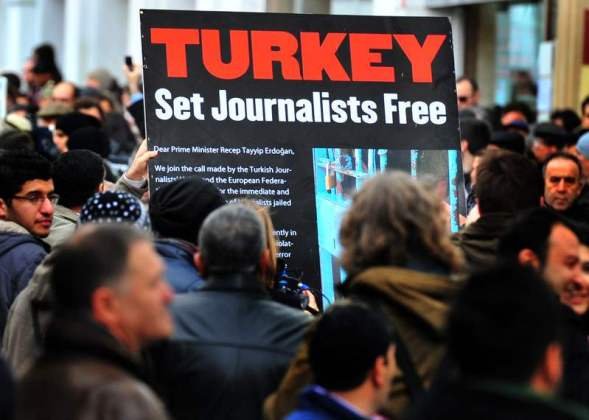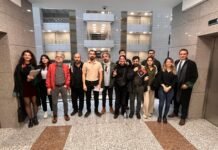Although the number of journalists jailed in Turkey’s prisons has begun to drop, journalists continue to face legal action for doing their job, with 109 journalists appearing in court in May and June, Turkish Minute reported, citing a report by the Expression Interrupted project.
The report titled, “Freedom of Expression and the Press Agenda,” is based on data obtained from trials and media monitoring work carried out by Expression Interrupted.
According to the report, 109 journalists appeared in courtrooms across Turkey in 51 trials throughout May and June. Among them, four were sentenced to a total of nine years, eight months and two days in prison. Prosecutors launched new trials against at least four journalists, while six journalists faced new investigations in the same period. At least three journalists were taken into custody.
In the same period three journalists including Mezopotamya news agency reporter Mehmet Aslan, who had been jailed pending trial since January, and Bugün daily journalist Cuma Ulus and Zaman daily news editor Erkan Acar, who had been imprisoned since July 2016, were released, bringing the number of journalists jailed down to 65. According to data compiled by Expression Interrupted, this number was 87 on the first day of 2021.
Both the Bugün and Zaman dailies were closed down by the Turkish government, while dozens of journalists from these dailies were jailed in the aftermath of a failed coup in Turkey in July 2016 on the grounds that they had links to the Gülen movement.
The movement, inspired by the views of cleric Fethullah Gülen, strongly denies any involvement in the failed putsch.
“Despite the seeming decrease in the number of imprisoned journalists, the judicial pressure faced by the media in the country has not improved. Trials against journalists continued in the period covered by the report, except during a 17-day Covid-19 lockdown in May. Several new investigations and indictments targeting journalists have also been issued during the period covered,” said the report.
The report also found that the increase in police brutality and interventions targeting reporters, especially those covering public demonstrations, as well as physical attacks on journalists were among the most significant issues faced by the media in Turkey in May and June 2021. At least five journalists were targeted by civilian attackers in the period covered.
Police intervention and brutality against reporters working in the field markedly increased with the implementation of a circular issued in late April by the General Directorate of Security, prohibiting all audio and video recording during public demonstrations, the report said.
Police used disproportionate force on demonstrators and journalists based on the circular, especially during May Day celebrations and Pride Week events in June.
Journalists who were trying to cover the demonstrations were physically assaulted by the police; some journalists were violently arrested, while some journalists’ equipment was broken by the police during interventions. The knee-on-neck arrest of AFP photojournalist Bülent Kılıç as he was covering the banned Pride parade in İstanbul became a symbol of increasing police brutality against journalists in Turkey, said the report.
Kılıç was filmed shouting “I can’t breathe!” as police officers pushed him to the ground and pressed their knees against his neck, prompting journalists’ groups to take to the streets in İstanbul, Ankara and İzmir in protest, under the slogan “We can’t breathe.”
Turkey, which is among the top jailers of journalists in the world, ranked 153rd out of 180 countries in the Reporters Without Borders (RSF) 2021 World Press Freedom Index announced in April.















